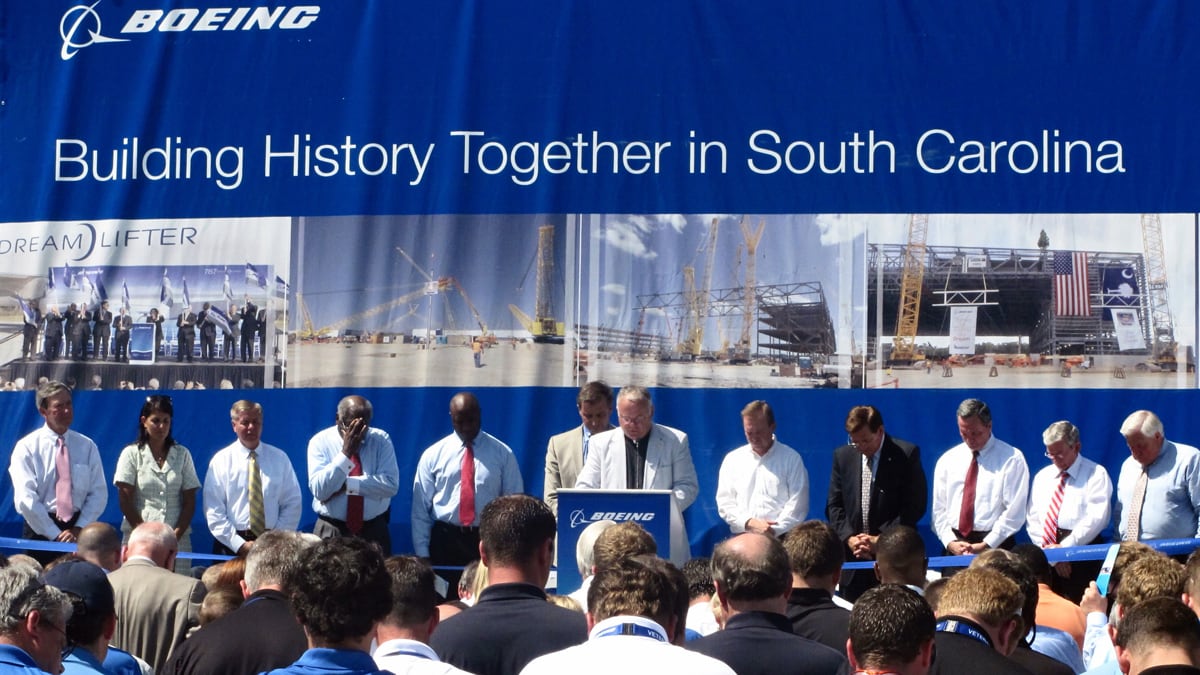It’s easy to imagine the 30-second TV ad: “You needed that job and you were the best qualified. But they had to give it to a union member near Seattle because the Obama administration wants to kill jobs and capitalism and tell corporations where to expand.”
Readers of a certain age may recognize the echo of an incendiary and strategically successful 1990 campaign ad for Sen. Jesse Helms. Back then, the job had to go to “a minority because of a racial quota.” The 2012 version, rooted in a complaint the National Labor Relations Board has lodged against Boeing over a new plant in South Carolina, resonates just as deeply. Forget its bureaucratic origins: This is a tale of regional tensions, existential labor struggles, and millions of stressed-out Americans with shrinking incomes or no jobs at all.
To recap: Boeing has just built and opened a non-union 787 Dreamliner assembly plant in North Charleston. The expansion into the right-to-work state came after executives warned that strikes by the company’s unionized workforce in Everett, Wash., had set back production and affected their deliberations on where to locate the new plant. The International Association of Machinists, which is trying to protect jobs in the Puget Sound area, calls that illegal retaliation; Boeing says hogwash. Absent a settlement, the federal complaint could take years to resolve.
Several Democrats told me voters don’t and won’t care about a technical case at an obscure agency. But Republicans are working hard to make voters care—perhaps one reason President Obama, unable to intervene directly in the workings of an independent agency, has urged Boeing and the union to “come to a sensible agreement.”
This wouldn’t be the first time Democrats failed to anticipate or even recognize a political threat and respond in a timely, effective way. Al Gore never defended himself head-on against character attacks. John Kerry didn’t rush to define himself as a presidential candidate, leaving time and space for the Swift Boat Veterans for Truth to do it for him. Obama and his party did not make a sustained, effective public case for the 2010 health-care reform law. Now we have the NLRB complaint against Boeing, and Republicans so far have the field to themselves.

Every GOP presidential candidate has weighed in, most using rhetoric along the lines of my imaginary ad. The No. 1 item on the House GOP’s fall agenda is South Carolina Rep. Tim Scott’s “Protecting Jobs From Government Interference Act.” Darrell Issa, chairman of the House Oversight and Government Reform Committee, has subpoenaed NLRB documents to investigate a case he says could set a “job-killing precedent.” South Carolina Gov. Nikki Haley, a rising GOP star, raises the issue every chance she gets, with everyone from Obama to Michele Bachmann.
“When you pick a fight like this in a state like South Carolina, you’re just asking for a holy war,” says Greenville-based GOP consultant Chip Felkel. “Somebody with some political acumen should have realized this is not going to look good, and it’s in a presidential primary state that’s going to get lots of national attention.”
The man who apparently “picked the fight” is Lafe Solomon, acting general counsel and a self-described low-profile “career bureaucrat” at the NLRB from 1972 to 2010, when Obama nominated him to be general counsel. He says politics were irrelevant—he investigated, found facts he believes point to retaliation, and tried for months to get the two sides to settle, as happens in more than 90 percent of NLRB cases. It didn’t work, so he filed the complaint. Now, he told me, sounding bemused, “We’re in sound bites in an election campaign.”
In the complaint he issued in April, Solomon cited repeated statements by company executives that past and future strikes were “overriding factors” in deciding to move a second Dreamliner production line to a non-union facility. He said there is reasonable cause to believe these statements violated federal labor law because they were coercive, retaliatory, and meant to chill future strike activity. “We certainly believe that the facts will show that the motivation was one of retaliation,” Solomon told me.
Boeing spokesman Tim Neale says there’s nothing illegal about executives talking openly about economic harm from strikes or factoring that harm into investment decisions. “I don’t know how you prove retaliation,” he told me. “We haven’t taken anything away from anybody.” But that, the union contends, is only a matter of time. Union leaders say Boeing plans to eliminate 1,800 Puget Sound jobs once the North Charleston facility is fully operational.
As central as the Boeing case is to Republican politicians, it is peripheral for Democrats. One Democratic strategist told me he had not focused on the situation. Another said the case is “just not that interesting to most people.” Mike Podhorzer, political director of the AFL-CIO, says there’s no evidence it has “high salience” with voters. “It’s really just the Republicans using the jobs crisis in a kind of shameless way to do favors for their corporate supporters,” he says. “Instead of creating jobs or providing real relief for the unemployed, they’re saying the problem is that our corporate friends are being treated as if they should follow the law. This is a bank shot.”
Maybe so, but consider the economic environment. In particular, consider South Carolina. Its 10.9 percent jobless rate in July was tied with Michigan for third place, trailing only Nevada and California. A tech consortium’s 2009 call for training to work at the new North Charleston plant drew 10,000 applications. Another one this summer drew 5,500. More than 450 people have completed phase one of the training since 2010; nearly half of them were unemployed when they applied. Boeing has spent upward of $750 million on the South Carolina plant, created 9,000 construction jobs to build it, added 1,000 jobs in the past year, and plans to add many more.
So who deserves the plant? South Carolina, with its awful unemployment rate? Washington, with its slightly less bad 9.3 percent rate? South Carolina, where Boeing workers earn about two-thirds the pay of their West Coast counterparts? Washington, which has showered Boeing with incentives over the years? Should Boeing have to transfer work back to the Puget Sound area to maintain jobs there? Should South Carolina workers have to lose their jobs for that to happen?
The machinists may yet win this case on the merits. Solomon says the NLRB has a 90 percent success rate in court, where it could be headed. And Democrats may yet come up with some response to the Republican onslaught, perhaps stressing fairness, the rule of law, or the loyalty companies used to have to the communities that nurtured them. But even in victory, Obama and his party could pay a political price. That’s especially true if they continue to ignore the big picture: the power of the Republican argument, the symbolism of the South Carolina case and, so far, their own failure to offer a strong, unified counterweight to the GOP narrative on jobs.






